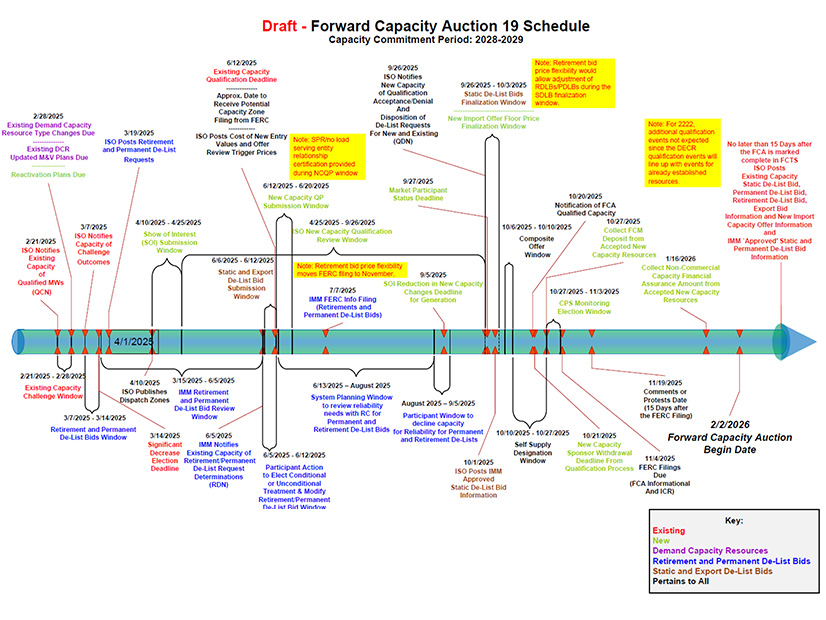A one-year delay of Forward Capacity Auction 19 (FCA 19) would have cascading effects in the five subsequent auctions, ISO-NE told the NEPOOL Markets Committee on Thursday.
ISO-NE has recommended a one-year delay of the auction to implement resource capacity accreditation (RCA) changes and discuss moving to a prompt and/or seasonal market for FCA 19. The auction is scheduled for 2025 and would apply to the 2028-29 Capacity Commitment Period. (See ISO-NE Recommends Delaying FCA 19.)
Alan McBride of ISO-NE presented to the MC on a proposed schedule for FCA 19 through FCA 25. Following a one-year delay of FCA 19, subsequent auctions would be conducted on a 10-month timeline, instead of the typical 12-month timeline. This would return the FCM to the typical 3½-year forward auction process for FCA 26.
This would mean that along with the delay of FCA 19, five auctions in a row would be delayed to some extent, while the first annual reconfiguration auction for capacity commitment periods 19 through 24 would be eliminated. If ISO-NE moves to a prompt capacity market for FCA 19, these changes would become obsolete.
ISO-NE has emphasized the importance of implementing RCA for FCA 19 but would not be able to accomplish this under the current timeline. The RCA changes will alter how ISO-NE accredits resources like oil and gas generators and energy storage in the forward capacity market.
The RTO said it hopes to submit the filing as early as possible in anticipation of a potential government shutdown in November and has scheduled an extra MC meeting on the morning of Oct. 26 to vote on the proposal. It then would go to a general vote at the Nov. 2 Participants Committee meeting.
Some clean energy stakeholders have expressed concerns about the effects that delaying FCA 19 would have on new resources looking to secure capacity rights in the auction.
Mike Berlinski of BlueWave, a company that develops, owns and operates solar and storage projects, said it’s “disappointing that ISO-NE had not considered the impact of delaying FCA19 by a year on the ability of new resources to participate in the Capacity market in the 2025-2026 period.”
“Because new resources need to go through an FCA qualification process in order to be eligible for a reconfiguration Capacity auction, which unlocks capacity payments for near-term periods, pushing back the FCA19 process … would create a one-year gap where new resources could not enter the capacity market,” Berlinski told RTO Insider, adding that this could hurt projects in development and lead to decreased supply in reconfiguration auctions.
“If ISO-NE is determined to delay FCA19, we hope they will agree to implement some alternative process to enable capable projects to participate in the capacity market in the interim period,” Berlinski said.
Analysis Group Report on Prompt, Seasonal Construct
Chris Geissler of ISO-NE detailed scope of work for the Analysis Group report on the potential structural changes to the forward capacity market.
The intent of the Analysis Group study is to weigh the “pros, cons and key considerations associated with moving to a prompt and/or seasonal capacity market,” Geissler said, adding ISO-NE will use this study to inform its ultimate recommendation.
The report will focus on the effects on market efficiency, entry and exit decisions, price volatility, interactions with capacity accreditation, and supplier offers and risk. Geissler added the analysis will be quantitative and qualitative.
Geissler asked for feedback as soon as possible, as ISO-NE hopes to share the report with stakeholders in December.
“Due to the limited time to complete the assessment, AGI may not be able to complete analysis that addresses every stakeholder request,” Geissler said.
The Analysis Group is planning to present the methods of the report at the November MC meeting.
Upward Mitigation Prevention
The MC approved one aspect of ISO-NE’s proposed compliance to FERC’s show cause order (EL23-62) on Wednesday. The show cause order directed ISO-NE to change or justify parts of its tariff relating to “mitigation rules that can result in market power mitigation that increases the offers of a market participant.”
To prevent potential upward mitigation, ISO-NE proposes to “compare each financial parameter (e.g., block or component) of the Supply Offer and Reference Level and use the lesser of the two values when performing certain automated mitigation procedures,” Andrew Withers of ISO-NE told the MC in September. “This differs from current practice, where the entirety of the Supply Offer is replaced with the Reference Level.”
Withers also detailed the RTO’s proposal to allow two fuel price adjustments (FPAs) to the supply offer, compared to the single FPA currently allowed. The higher FPA of the two would be triggered at a designated MW threshold and is intended to better represent how fuel costs can increase as energy output increases.
Withers said ISO-NE still is evaluating the viability of this proposal and the tariff changes it would require.
FRM Market Power Concerns
Ash Bharatkumar of ISO-NE presented on proposed changes to the Forward Reserve Market (FRM) to address market power concerns raised by the Internal Market Monitor in the spring markets report.
ISO-NE proposes to reduce the Forward Reserve offer cap from $9,000/MW-month to $6,300/MW-month and move to a 12-month delay on the publication of auction offer data, compared to the current four-month delay.




